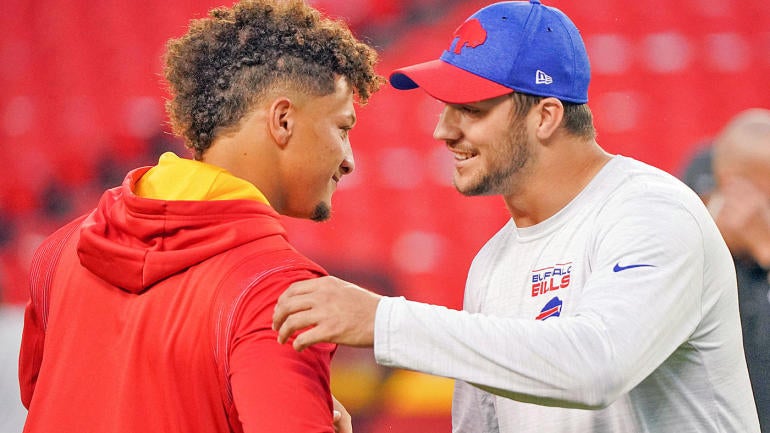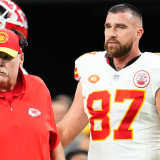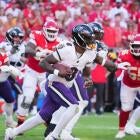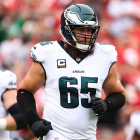Watch Chiefs vs. Bills: TV channel, live stream, odds, pick, NFL schedule for divisional round AFC playoffs
Here's what to watch for when the Chiefs and Bills clash in the NFL playoffs

The marquee game of the divisional round of the 2021 NFL playoffs pits the two-time reigning AFC champion Kansas City Chiefs against the Buffalo Bills. This is a matchup most football observers have been looking forward to all year, and it's finally here.
We've seen this matchup three times over the last two seasons, but that doesn't make it any less exciting that it's happening again. It's not a battle for the AFC title like we might have expected it to be, but it's still happening -- and it's going to be a whole lot of fun. Let's break down what to watch for on each side of the ball.
How to watch
Date: Sunday, Jan. 23 | Time: 6:30 p.m. ET
Location: Arrowhead Stadium (Kansas City)
TV: CBS | Stream: Paramount+ (click here)
Follow: CBS Sports App
Odds: Chiefs -1.5, O/U 54
When the Bills have the ball
The first time these two teams played was likely the nadir for a Chiefs defense that at the time looked like it would undermine the team's chances of making a serious run at another Super Bowl. The Bills were able to do essentially whatever they wanted, to the point where the Chiefs made dramatic personnel changes in the wake of their performance.
The Bills set the tone right from the jump, utilizing heavier personnel and quickly moving the ball downfield on their opening drive of the game. The thing that jumped out the most was their use of Josh Allen as a threat in the run game, which flummoxed Kansas City on that dominant opening drive.
Allen has been on a roll as a runner of late: he has rushed for at least 60 yards in each of the Bills' last four games, and has rushed for 689 yards and three touchdowns over the team's last eight contests. His combination of size, speed, and power is unmatched among quarterbacks in the NFL at the moment, and it makes him incredibly difficult to deal with in the run game -- especially considering his proficiency for throwing on the move.
In the first matchup against Kansas City, Allen was firing missiles all over the field -- both on the move and from a standstill in the pocket. He picked on safety Daniel Sorenson more than anyone else, and Sorenson was subsequently benched in favor of Juan Thornhill. But Sorenson wasn't his only victim; Allen beat just about every Chiefs defender over the top. It was an absolute laser show.
Crucially, the Bills were also able to make gains in the short passing game, something that has been increasingly true over the last several weeks as Devin Singletary has emerged as a featured option in the offense. Allen's willingness to check the ball down if he had nothing open deep, as well as Buffalo's ability to design short passes with blockers out in front of the receiver, played a big role in making sure the Chiefs defenders did not simply bail backward at the snap to take away deep throws.
It's worth noting several significant changes from that first game, though. As mentioned, Sorenson has been shifted to a reserve role. He played 100 percent of the Chiefs' defensive snaps against Buffalo, but has exceeded 51 percent only twice since then. In addition, Chiefs star Chris Jones did not play in that first contest. Plus, the arrival via trade of edge rusher Melvin Ingram has kicked Jones back inside, where he is at his most effective as a pocket-pushing pass rusher. Getting pressure on Allen while also keeping him contained in the pocket will be of paramount importance for Kansas City's defense, and it will obviously be easier to do so with those two players on their side. Those changes, along with Chiefs defensive coordinator Steve Spagnuolo getting more comfortable utilizing his team's personnel, work in Kansas City's favor.
However, Buffalo has also undergone some changes since that first matchup. The team's offensive line is playing better now, particularly in the run game. Singletary's emergence as a two-way threat has added a new dimension to the team's varied attack. Allen's willingness to hand the ball off more often on RPO (run-pass option) plays has made the play-action passing game more dynamic, as team's no longer believe Buffalo is only willing to run the ball as a last resort. Allen is also getting to his checkdown options far more quickly than he was earlier in the season, allowing players like Singletary, Knox, and even Stefon Diggs to do better work after the catch.
When the Chiefs have the ball
It's impossible not to view this matchup through the prism of the game these two teams played back in Week 5, when the Bills defense played one of the best games any defense played against the Chiefs all season. Kansas City ended up with respectable full-game numbers, but because of how the Bills elected to structure their defense, the Chiefs had to work extremely hard for all of their points. Each of the Chiefs' four scoring drives took at least seven plays, and two of them took 12 or more. That's not how the Chiefs want to live.
If you've paid attention to the conversation surrounding the Chiefs offense all season, it should come as no surprise to you that Buffalo played the game very conservatively on defense. On Patrick Mahomes' 63 dropbacks, the Bills did not send a single blitz, according to Tru Media. It was the only game all season where a quarterback dropped back to pass at least 20 times and was not blitzed at all. In the last five years, the only other time that has happened was ... when the Bills played the Chiefs in 2020 and did not send a single blitz at Mahomes.
The Bills utilized two-high safety looks on a near every-snap basis, and often stayed in two-high coverages. They played 28 snaps of Cover-4 on Mahomes' 63 dropbacks, per Tru Media, a 44.4 percent rate. That's the second-highest rate of Cover-4 any team used in a single game all season. Mahomes completed 17 of 23 passes on those plays, but for only 132 yards -- an average of just 5.7 per attempt. (He averaged 7.4 per attempt on the season, and that was his career-low figure to date.)
Not only did the Bills play a ton of Cover-4 (as well as Cover-2 and 2-Man), they did so about as conservatively as possible. They routinely lined up safeties Micah Hyde and Jordan Poyer about 15 yards off the line of scrimmage, and had them backing up at the snap of the ball. At the same time, they had their corners pressed up near the line up scrimmage to make releases difficult for Kansas City's wide receivers. The result was making it almost impossible for the Chiefs to drive the ball down the field. Just about their entire passing game was built around short throws. Mahomes averaged just 6.7 air yards per attempt, per Tru Media, which to that point was the sixth-lowest single-game mark of his career.
Not only did the Bills force short throws, they did a terrific job of rallying to the ball and limiting gains after the catch. The Chiefs averaged just 4.2 yards after catch per completion, their fourth-worst mark of the Mahomes era.
If and when the Chiefs did try to throw a bit father down the field, the windows simply were not there. The Bills was just plastered all over the receivers in coverage, all game long. They often had two defenders in a receiver's face at the moment a pass arrived, thanks to their playing two-deep looks and providing help over the top.
The Chiefs also just made a bunch of uncharacteristic errors, which were unfortunately pretty characteristic early in the season. There were plays where it appeared players ran the wrong route; throws where Mahomes simply missed an open man; and tipped passes that resulted in interceptions.
It's worth noting the differences between this game and that one, though. First of all, star cornerback Tre'Davious White will not be on the field for the Bills. He's Buffalo's best and most physical corner, and he did a terrific job against Tyreek Hill, who finished the game with just seven catches for 63 yards on 13 targets. Chiefs right tackle Lucas Niang struggled against Buffalo, but he's since been replaced by Andrew Wylie. Each of those personnel differences work in the Chiefs' favor.
Perhaps most interesting, though, is the potential for Chiefs running back Jerick McKinnon to affect the game. If Buffalo is going to force Mahomes to check down, the Chiefs will need to create yards after the catch. McKinnon simply has more juice than either Clyde Edwards-Helaire (who looks set to return from injury) or Darrel Williams (who might sit out), as he showed last week against the Steelers when he turned a season-high 18 touches into 142 total yards and a touchdown. His six catches resulted in 81 receiving yards. He had 106 yards after the catch, because his targets totaled -25 intended air yards. That could be extremely valuable in this matchup, as we saw on McKinnon's one impactful play in the first matchup.
Utilizing McKinnon underneath could get Buffalo's linebackers to creep up, opening a passing lane in the intermediate area of the field. Finding ways to high-low players like Matt Milano and Tremaine Edmunds could be a path to more big plays than the Chiefs made in the first game. Figuring out how to create those explosives is Kansas City's toughest challenge, as the Chiefs will not see a defense all playoffs long more focused on taking them away.
In the event that those plays simply are not there, though, the Chiefs have to be both willing to take the short gains through the air or on the ground, and able to execute at a level that makes doing so sustainable. Kansas City undoubtedly has to test the Bills down the field just so they don't squeeze the offense too much, but Mahomes also has to remain patient and not force things that aren't available to him, resulting in turnovers the Chiefs cannot afford in this matchup.
Prediction: Bills 33, Chiefs 27


















